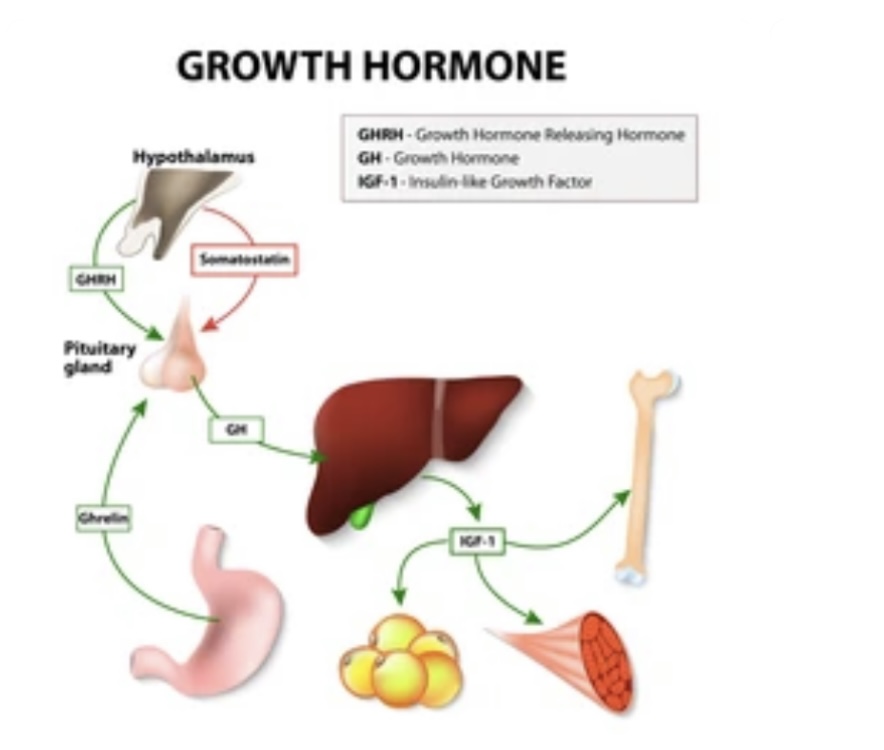Introduction
Growth hormone deficiency (GHD) is a medical condition that occurs when the pituitary gland fails to produce an adequate amount of growth hormone (GH). While this condition primarily affects children, it can also manifest in adults. In this article, we will explore the causes, effects, diagnosis, and treatment of growth hormone deficiency, shedding light on this critical aspect of human growth and development.
The Role of Growth Hormone
Before delving into the specifics of growth hormone deficiency, it’s essential to understand the crucial role growth hormone plays in the body. Growth hormone, also known as somatotropin, is produced and released by the pituitary gland, a pea-sized gland located at the base of the brain. Its primary functions include:
- Stimulating Growth: Growth hormone is pivotal in promoting growth during childhood and adolescence. It influences the growth of bones, muscles, and tissues.
- Metabolism Regulation: GH helps regulate the metabolism of fats and sugars, maintaining a balanced energy state in the body.
- Cell Growth and Repair: It supports the growth and repair of cells throughout life, aiding in tissue regeneration and organ maintenance.
Causes of Growth Hormone Deficiency
Growth hormone deficiency can occur due to various factors:
- Congenital GHD: Some individuals are born with GHD, a condition known as congenital growth hormone deficiency. This can result from genetic mutations or structural abnormalities in the pituitary gland.
- Acquired GHD: Acquired growth hormone deficiency can develop later in life, often as a result of damage to the pituitary gland. Common causes include:
- Tumors: Both benign and malignant tumors, especially in the brain, can interfere with the pituitary gland’s ability to produce GH.
- Head Trauma: A head injury that damages the pituitary gland can lead to GHD.
- Infections: Certain infections can affect the pituitary gland’s function.
- Radiation Therapy: Radiation treatment for brain tumors or other medical conditions may disrupt pituitary gland function.
- Autoimmune Diseases: Some autoimmune diseases can lead to GHD by attacking the pituitary gland.
Effects of Growth Hormone Deficiency

The effects of GHD vary depending on when it occurs and the severity of the deficiency:
- Childhood GHD: In children, GHD can lead to stunted growth, delayed puberty, and a lack of secondary sexual characteristics. It can affect a child’s height and overall development.
- Adult GHD: When GHD manifests in adulthood, the effects may include decreased muscle mass, increased body fat, reduced bone density, and reduced exercise capacity. Other symptoms can include fatigue, changes in mood, and impaired cognitive function.
Diagnosis of Growth Hormone Deficiency
Diagnosing GHD involves several steps and medical assessments:
- Physical Examination: A healthcare provider will evaluate a patient’s growth and development, looking for signs of growth hormone deficiency.
- Blood Tests: Blood tests, particularly those that measure insulin-like growth factor 1 (IGF-1) and insulin-like growth factor-binding protein 3 (IGFBP-3), can provide valuable information about GH levels.
- Stimulation Tests: These tests involve administering a substance that should increase GH production and measuring the body’s response. The most common stimulation test is the insulin tolerance test (ITT).
- Imaging: In cases where tumors or structural abnormalities are suspected, imaging studies such as MRI or CT scans may be performed.
Treatment Options for Growth Hormone Deficiency

Fortunately, GHD is a treatable condition. The primary treatment for growth hormone deficiency is the administration of synthetic growth hormone. This hormone is biologically identical to the GH produced by the pituitary gland and is administered through daily injections. The goal of treatment is to stimulate growth, improve body composition, and enhance overall well-being.
Monitoring and Long-Term Care
Patients with GHD require regular monitoring to adjust treatment and assess progress. This includes tracking growth and evaluating the effectiveness of growth hormone replacement therapy. While treatment can lead to significant improvements in growth and overall health, it is essential for individuals with GHD to adhere to their treatment plan and maintain regular check-ups with their healthcare providers.
Conclusion
Growth hormone deficiency is a condition that can significantly impact an individual’s physical and emotional well-being. While it often presents challenges, it is important to remember that this condition is treatable. With early diagnosis and appropriate treatment, individuals with GHD can achieve improvements in growth, body composition, and overall quality of life.
Understanding the causes, effects, and treatment options for GHD is essential for both patients and their healthcare providers. By shedding light on this condition, we can empower those affected by it to seek the necessary care and support, ultimately allowing them to lead fulfilling lives.
Discover more from ZOOLOGYTALKS
Subscribe to get the latest posts sent to your email.


